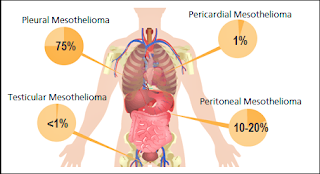Peritoneal Mesothelioma - Treatment and Life Expectancy
Peritoneal mesothelioma is cancer found in the peritoneum, a thin membrane that surrounds the abdomen. Due to asbestos exposure, peritoneal mesothelioma is very rare, and its prognosis is generally poor.
Peritoneal mesothelioma (formally known as malignant peritoneal mesothelioma) is the second most common type of mesothelioma, accounting for about 15-20 percent of all new mesothelioma diagnosed each year. There are four major differences between peritoneal mesothelioma and other types of diseases:
Location: Peritoneal mesothelioma occurs in the lining of the abdomen (peritoneum), a dual layer membrane that surrounds the abdomen and other abdominal organs. The visceral layer protects the organ like the liver and the gallbladder inside the abdomen, while the parietal layer covers the outer part of the abdomen.
Symptoms: Due to the location of the disease, peritoneal mesothelioma symptoms most commonly develop in the stomach and/or the gastrointestinal system, not in the chest and lungs.
Treatment: The most effective treatment for peritoneal mesothelioma is a cytoreductive surgery followed by Hyperthermic Intraperitoneal Chemotherapy (HIPEC) - a deadly "washing" chemotherapy that kills cancer cells in the stomach.
Survival: Peritoneal mesothelioma patients generally have better prognosis and survival rates than those with other forms of illness.
What are the Symptoms of Peritoneal Mesothelioma?
The symptoms of peritoneal mesothelioma can take decades to appear after exposure to asbestos. As symptoms begin to develop, they usually develop first in the abdomen and/or gastrointestinal system, although some symptoms (such as weight loss or fever) can be systemic.
General Symptoms:
- Stomach ache
- Swelling of the stomach
- Anorexia/weight loss
- Ascites (fluid in the peritoneal cavity)
Unusual Symptoms:
- Sweating at night
- Hypercoagulability (blood clotting)
- Fever without origin is known
- Intestinal obstruction
- Inflammatory lesions
Peritoneal mesothelioma can cause other specific conditions, known as a paraneoplastic syndrome, which may show additional symptoms. These include:
Thrombocytosis - high platelet counts in the body's blood supply
Hypoglycemia - low blood sugar
Venous thrombosis - blood clots formed in blood vessels
Prognosis for Peritoneal Mesothelioma
While the prognosis for all forms of mesothelioma is generally poor, the prognosis for peritoneal mesothelioma is somewhat better than other types of diseases. The mean survival rate for peritoneal mesothelioma is 1 year, and the longest survival is 19 years.
Prognosis Factors for Peritoneal Mesothelioma Patients
- Cell type
- Size of tumor and staging
- Sex Patients
- Whether cancer has spread (metastasis)
How Is Peritoneal Mesothelioma Diagnosed?
Because peritoneal mesothelioma symptoms are often similar to other diseases, diagnosis can be difficult. Typically, diagnostic tests focus on the earlier tightening of more common diseases, including other forms of cancer.
Imaging Scans - Used to search for tumor mass
Blood Test - Used to search for biomarkers and abnormal substances in the bloodstream
Abdominal Biopsy - Used to obtain tissue samples to confirm the diagnosis of peritoneal mesothelioma
The most common diagnostic errors for peritoneal mesothelioma include irritable bowel syndrome (IBS), hernia, and other stomach cancers, especially ovarian cancer.
As part of the diagnosis of mesothelioma, the doctor will determine the stage of his cancer. Although there is no staging system for peritoneal mesothelioma, doctors may try to identify how far the disease is using the relevant criteria.
What treatments are available for peritoneal mesothelioma?
All types of mesothelioma are treated using a combination of three types of therapy:
- Surgery - Known as debulking or cytoreduction, the ultimate goal is to remove as many tumors as possible.
- Chemotherapy - Systemic treatment (usually given intravenously) that kills rapidly growing cells, including mesothelioma cancer cells.
- Radiation - A radiation explosion targeted to reduce the size of a cancerous tumor.
Estimated Cost of Peritoneal Mesothelioma Treatment
Like cancer, peritoneal mesothelioma treatment costs can be very high. Fees typically fall into the following categories:
- Diagnostic cost
- Cost of treatment
- Recovery and follow-up costs
The amount a person can incur depends on many factors, including the specific diagnosis, the stage at which the disease is found, their insurance coverage, and even where they live.
Because peritoneal malignant mesothelioma is caused by asbestos, individuals diagnosed with this form of cancer may be eligible for legal compensation for medical expenses, lost wages, and the pain and suffering associated with the disease.
Learn more about the financial help that is available if you or a loved one has been diagnosed with peritoneal mesothelioma. The financial aid options available to you may include mesothelioma trust funds as well as grants to cover travel, maintenance, and housing. You can also explore your legal right to compensation from the asbestos company responsible for your exposure to asbestos.





